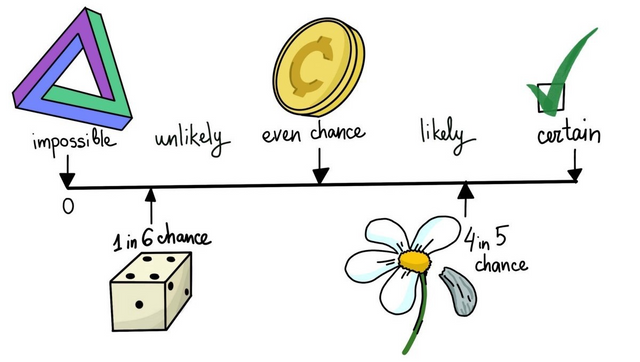The waves of possibilities never end ....
Probability waves
However, how can we use the above to explain the double-slit experiment? What plays the role of wave energy in an example of water is the possibility that the electron will fall to a specific place on the screen. Therefore, we can explain what we see if we assume that what describes the behavior of the electron is a wave, whose square of capacitance (capacitance is a term corresponding to the height in the case of water waves) expressing the possibility that we observe the electron at some point of the screen, and this wave is what interferes with itself to give us The pattern we are seeing in the double slit experience! 4
This is pretty cool, because it explains why the interference pattern has emerged even though we release individual electrons in the two-fold experiment. However, we have seen that we still have a big hurdle, and this hurdle is the explanation for the disappearance of the interference pattern when we try to measure exactly any electron slit.
In fact, the simplest explanation we can put in place for this is to add a new rule that says that before we measure an electron, it represents a wave that expresses a mixture of all the results that we can obtain after the measurement (in this case the transit from the first slit or from the second slit It gives an interference pattern, except that once we try to perform an measurement on the electron, we will find only one possible case after the measurement and not a mixture of all of them (here, for example, we will find that the electron has passed through a specific slit) so the interference pattern disappears.
You may say to yourself, that this is very artificial and absurd, but it is true or not, as this is the rule adopted in quantum mechanics to obtain amazing experimental predictions of it which is the basis of the technology that we use in our lives today!
Conclusion
We have now built a model that we can use for calculations and draw experimental results using the strange rules mentioned above, and this model has already achieved a very amazing success with the interpretation of experimental observations. On the conceptual level, however, it presents several major problems:
First, what is the nature of this wave that represents the behavior of the electron? Does it have a real physical presence or is it just a tool that helps us do maths? Here, I must point out an important point for those who know few readers of mathematics. If accuracy is sought, the probability is not calculated from the square of the amplitude of this wave, but from the square of a long this amplitude, because the amplitude of the wave as indicated by examination is not just a positive or negative number only It can also be a nodal number. What exactly does this wave represent?
Secondly, the state before the measurement is a mixture of possible states after the measurement as we have seen, and it is radically different from it (we have seen that the state before the measurement in the double-slit experiment has given an interference pattern unlike the state after the measurement, which is the state of the electron crossing from a completely defined slit) . What is the nature of this case before the measurement?
Third, what do we mean by the word measurement? Who does the measurement? And what exactly does the meter do for the sentence? Let us imagine together the following situation: Suppose we came with a measuring device to measure from which slit the electron passed. Here we have the right to ask the following question: The complex sentence consisting of the measuring device with the electron, can be in one of two cases: “an electron passed from the first slit and the measuring device has measured it over the first slit”, or “an electron passed through the second slit and a device Measurement has been measured over the second slit. ”
